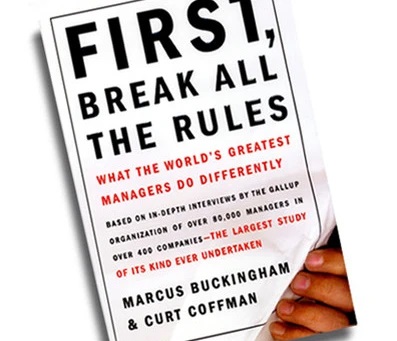‘First Break All the Rules: What the World’s Greatest Managers Do Differently,’ the well-known classic written by Marcus Buckingham and Curt Coffman, provides its readers with an in-depth analysis of the strategies great managers use and why these ways of leading are so effective. In this book, Buckingham and Coffman review four guiding principles – select for talent, define the right outcomes, focus on strengths, and encourage employees to find the right fit – that all managers should follow. This book is a must-read for managers looking to diversify their team, improve their work performance and efficiency, and strengthen their communication and connection.
There are many golden nuggets from this read, but below are three quotes that stood out:
1. “In most cases, no matter what it is, if you measure it and reward it, people will try to excel at it.”
In the absence of specific, job-related performance criteria and measures, we create a guessing game of what is expected on the job. Left up to interpretation, we sacrifice quantifiable and quantitative measures of what constitutes a job well done vs. a mediocre job vs. a substandard job. Set clear expectations, and the employee will strive to succeed.
2. “Identify a person’s strengths. Define outcomes that play to those strengths. Find a way to count, rate or rank those outcomes. And then let the person run.”
To facilitate and foster growth within a business, we need to focus on our employees, empowering them to identify and utilize their skills. This is where coaching and mentoring can come into play.
Here is a non-extensive list of the advantages of mentoring within your company:
-
Personal Development: Employees feeling empowered and autonomous over their own career will help increase loyalty and efficiency.
-
Accountability: The employees have resources that make the attainment of a goal more doable and builds a sense of accountability within the employee to see the project through.
-
Efficiency: Harnessing the employee’s strengths can help employees continually reinforce their skills and close performance gaps to improve overall business efficiency.
-
Retention of employees: Open communication and transparency contribute to higher retention as it anchors employees to the organization and connects it back to accountability.
3. “People leave managers, not companies.”
Leaders play a pivotal role in shaping motivation and engagement. A manager who invests in recognizing individual and team contributions will leave employees feeling valued and appreciated, ultimately resulting in employees who are loyal, hard-working, and committed to you, the organization, and its people.
To read our other book reviews and our previous blogs, visit:




